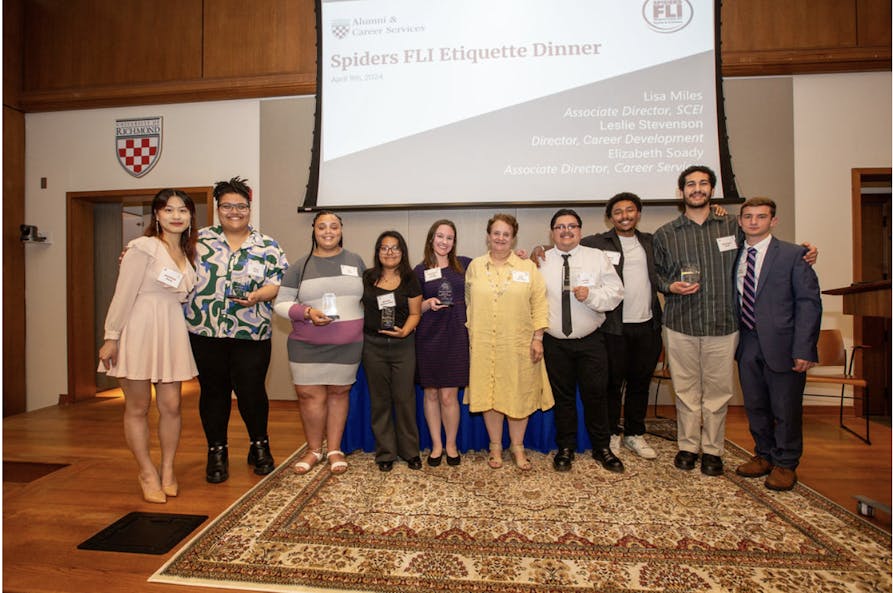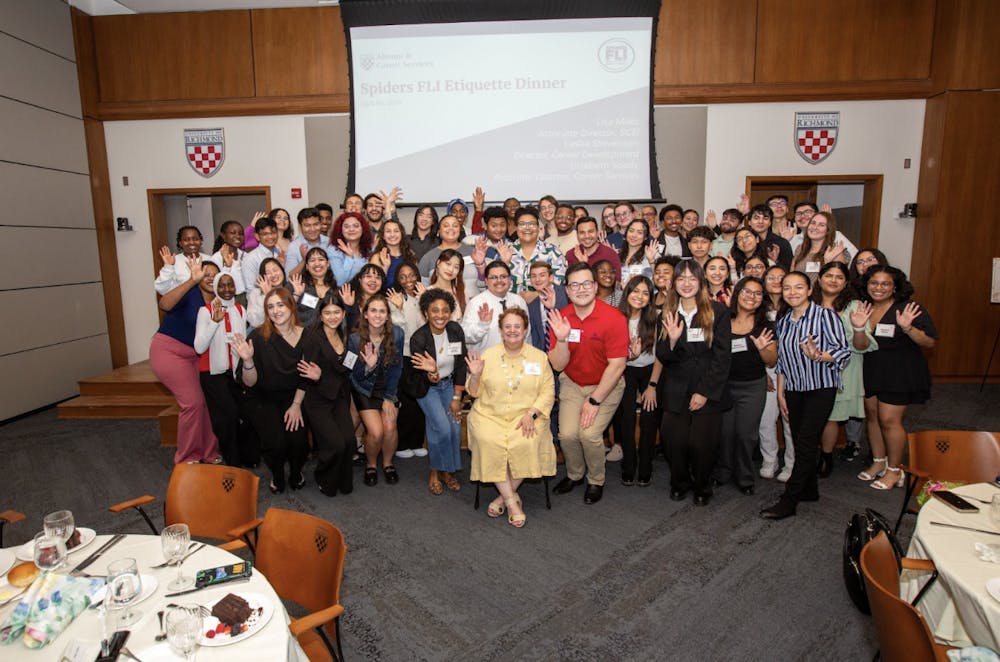After 17 years at the University of Richmond, Lisa Miles, associate director of the Student Center for Equity and Inclusion and the creator behind Spiders First-generation and Limited-income program, retired from her role this June. Now, she’s visiting for UR’s First-Generation College Celebrations, commemorating 10 years of the first-gen programming she spearheaded on campus.
Miles started at UR in February 2007 as the program coordinator in the Office of Common Ground, the original diversity and equity initiative on campus, which merged with Multicultural Affairs to become the Student Center for Equity and Inclusion in 2021.
Miles was working with a group of student leaders in a program she used to run called Cultural Advisors that headed SpiderNights, a series of substance-free late-night events that took place on Fridays and Saturdays throughout the school year, according to its website. Many of the student leaders she managed identified as first-generation college students, and from working alongside these students, Miles learned their stories and the obstacles they faced adjusting to college life.
After earning a master’s degree in higher education from the University of Vermont, Miles understood the transition into college wasn’t the only thing that mattered for first-generation college students.
Miles ultimately realized that this population of students was overlooked and saw the potential for a support system dedicated to them. She asked her boss at the time, Glyn Hughes, if she could start a program for first-generation students from an allotted $5,000 budget, and he agreed.
“Now it feels like the university can’t imagine it wasn’t supporting first-gen students,” Miles said. “It feels like it’s in the fabric of student support here.”
Miles said that in the program’s beginning stages, many argued that students wouldn’t want to publicly identify themselves as first-gen because it would make them feel inadequate. Yet, she insisted that being a first-generation student is a point of pride and to be celebrated.
As time passed, Miles said it was encouraging to see more and more students confidently claim that piece of their identity.
In the 17 years Miles worked at UR, 10 were spent supporting first-gen students. Then, three years ago, Miles decided to add limited-income students to the list of students served by the program she spearheaded, changing the name from Spider Firsts to Spiders FLI.
“They’re not all the same students, but they have a lot in common regarding how easy it is for them to access everything here and what some of the challenges are,” she said.
Miles credits the increased visibility and support for these underrepresented students as the greatest change on campus since her arrival.
“We’ve normalized students claiming the term first-generation with a sense of pride,” she said.
Enjoy what you're reading?
Signup for our newsletter
Junior and FLI mentor Sahar Bajwha reflected on her experience in the program since she joined during her freshman year.
“Lisa was one of the first people that I really connected with on campus, and being an international student, I was looking for that place where I could feel comfortable,” Bajwha said.
When Bajwha became a FLI mentor her sophomore year, she said she was regarded warmly by Miles, who was always there to help and support her in any way possible.
“She’s always at events; she always shows up,” Bajwha said. “Everyone’s so busy, but Lisa always makes the time to come to events and support each one of us.”
Bajwha said she hopes the community that Miles has built at UR continues to thrive, especially since for Bajwha, Miles served as the glue to hold everyone together.
Working with students was Miles’ favorite part of the job. She reminisced about FLI’s first annual etiquette dinner, which nearly 100 students attended. Participants learned which knife and fork to use, how to make appropriate small talk at the table and skills necessary for students when they attend business dinners in the future.
The etiquette dinner wasn’t the only event FLI hosted during the 2023-2024 academic calendar year. FLI students went apple picking at Carter Mountain and took a weekend trip to Washington D.C. in the 2023 fall semester.

“In the last two years we’ve had some additional funding to do more events with students,” Miles said. “And part of these events is about trying to take students off campus.”
Miles explained that FLI students are less likely to have a car, and with UR’s campus tucked in the middle of the suburbs of Richmond, it’s difficult to get around. Limited-income students also may have less disposable income to spend on leisurely activities like taking a trip to go apple picking on their own.
For Miles, the D.C. trip, supported through the extra funding, was about two things. First, taking students likely with limited resources to travel while they're in school, to a place they have never been before, and second, providing them culturally immersive experiences.
“Then we also took students to see ‘Hamilton’ because it happened to be at the Kennedy Center the same weekend,” Miles said. “I think that was kind of life-changing for some people who hadn’t been to the theater.”
Miles noticed more people taking an interest in this population of students.
Funding for the program has significantly increased since Miles started it. Miles said that one family has given over $30,000 in the last two years to the program and recently decided to donate to UR’s endowment in FLI’s name.
“In the words of the first major donor who had a child at UR, we know that we’re fortunate enough to give our children all the resources they may need, and college is still hard,” she said. “What if we didn’t have those resources? How could we possibly make it easier for those students?”
Brian Garcia, ‘24, started as an FLI mentee his first year and then became a FLI mentor, being inspired by the friendship that he created with his own former mentor.
Garcia said he views Miles's departure as a well-deserved break from a well-rounded career.
“Though, I’m sad no one else is going to experience Lisa,” he added.
Miles said she would miss her students the most, as they have been at the center of her work all these years. The students are why she came to Richmond and started the FLI program, she said. As her retirement approached, she started to think about legacies and the one she’d leave behind at UR.
“I think we’ve proved it’s not a trend. It’s not a fluke. Students are coming in numbers to our events,” Miles said. “It’s a key part of our community here that I think will go on, and that feels good to know.”
Contact writer Grace Randolph at grace.randolph@richmond.edu.
Support independent student media
You can make a tax-deductible donation by clicking the button below, which takes you to our secure PayPal account. The page is set up to receive contributions in whatever amount you designate. We look forward to using the money we raise to further our mission of providing honest and accurate information to students, faculty, staff, alumni and others in the general public.
Donate Now



